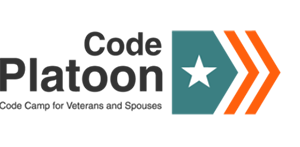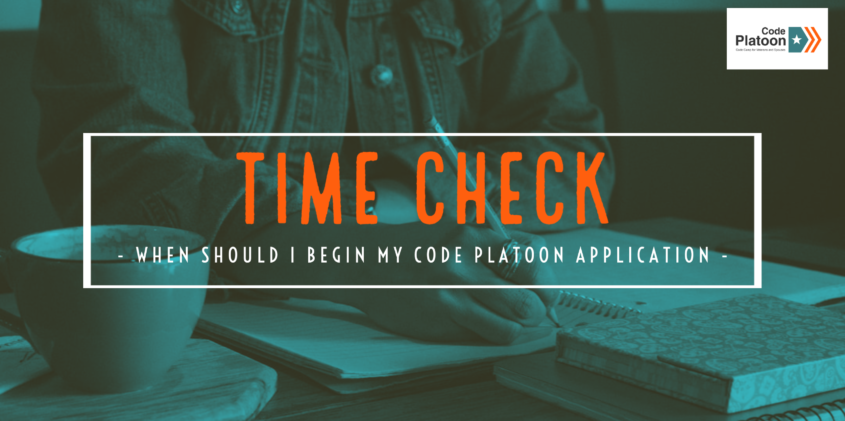Time Check – When should I begin my Code Platoon application?
So you’ve decided to pursue a career in software engineering and have chosen Code Platoon as your place of learning. Now what?
Just like any top-tier coding Bootcamp, you can’t just walk into Code Platoon off the street with zero knowledge and start day one—you have to have at least some understanding of the fundamentals of Coding.
So how do you get that understanding, and how long will it take? How far out should you begin preparing for coding challenges and funding issues that may arise? That’s the focus of this blog post.
Let’s start with the application process – more specifically, Part Two of the Code Platoon application.
One of the questions I get regularly is, “why do I need to pass a coding test if I want to go to school to learn to code?” It’s a fair question. Here’s my take on the subject.
Imagine going to a school that had no entrance exam. Without some assessment before the start of classes, two things might happen. Either the first day will be incredibly rudimentary or will be way beyond most students’ skill levels. Whatever the case, it may force everyone into a sink-or-swim situation.
That’s not going to happen at Code Platoon because of our coding challenges. The Coding Challenges in Part Two of the application process show that all students entering our program have a coding knowledge level that allows them to succeed on day one. That assures our students don’t just walk into the class unprepared for day one.
As I like to tell everyone, imagine if everyone who showed up for Basic Training had already been running two miles a day and what kind of difference that would’ve made for your first week.
But how long does it take to walk that talk in the world of Code Platoon? I’m glad you asked.
Let’s start with the assumption that you are starting at zero. Your only computer experience involves email and possibly looking at music videos – because that is what the internet was invented for (and because MTV robbed us of that decades ago), right?
Suppose you know more than that, great! It means that everything that follows will be shorter for you than others.
The first place to start is our Intro to Coding program, which is entirely free of charge and self-paced. Intro to Coding is for total beginners with absolutely no coding experience. If you look there, you’ll notice 12 video lectures, the longest of which is just under 28 minutes, and the rest are under 16 minutes. These all come with accompanying practical exercises for students to work through.
The second place is our Bootcamp Prep, which is also free of charge and self-paced, or you can take a live-online version that offers a sneak peek into how our instructors teach. Although Bootcamp Prep is a little longer, consider that both courses combined have about 8 hours of total video lectures and, when done back-to-back by a complete novice, take somewhere in the neighborhood of 30-50 hours to complete.
How long will it take you to finish all of this is, of course, individually dependent. Some students can read half a book in a day and ace a test, whereas other students take longer to absorb the information needed. But this isn’t a race—some who take longer to do the same task end up with a more robust understanding of that topic in the long run.
Beyond our application challenges is our deadline for the application itself, which typically occurs three months before the beginning of the actual program. We need time to get you enrolled, ensure all of your VA paperwork is in order, and determine scholarship eligibility pre-work to complete, enabling students to hit the ground running on Day One of their class starting.
So, when considering all of this, the average student—who has no prior experience and is currently employed—should plan accordingly (at the very least, but earlier is typically better):
- Allow three weeks to complete Intro to Coding and Bootcamp Prep (2hrs/day*3 weeks = 42 hrs).
- You should set aside at least eight hours to complete the Coding Challenges (Please note: the challenges are not timed and do not need to be completed concurrently).
- Plan for one day to complete the video and essay submissions from Part Two of the application.
- Once you are accepted, allow for three months to do pre-work and prepare for the program.
- Total: Approximately four months from the time preparation starts to the time the cohort begins.
These are, of course, approximate times —this can all be done quicker, for sure, but don’t feel like it has to be. You don’t get extra points for being fast; your acceptance to the program is contingent on a solid application. For example, you can triple the number of hours per day you spend on the prep work and complete it in one week, but your scores on the coding challenges are what we evaluate —not the time to finish the prep work.
It’s good to be early for the sake of enrollment, but not at the cost of submitting solid work on the coding challenges.
SkillBridge
Students interested in attending Code Platoon through the SkillBridge program should allow time for all of the above in addition to the time it takes to get SkillBridge paperwork completed. Luckily, these things can happen simultaneously. There is no reason why you can’t submit for SkillBridge approval while concurrently completing the Intro to Coding or Bootcamp Prep courses.
Just keep in mind that SkillBridge approval, like most things in life, takes time. Please don’t assume that you will hand your commander the paperwork and get it signed right then and there. Prepare to take care of approvals well in advance, and recognize that these dates need to line up with your last 180 days of service.
Code Platoon has extensive experience helping SkillBridge students get what they need. We are here to help.
Hopefully, all of this helps provide some insight, but as always, if you have more questions, please feel free to email me personally, and I can either answer your questions that way or set up a time to chat. Greg@codeplatoon.org
Greg Drobny is a former Airborne Infantryman, PSYOP Team Chief, political consultant, professional mil blogger, and is Code Platoon’s Student Outreach Coordinator. He holds a BA in history, a Masters of Science in organizational psychology, and is currently pursuing an MA in history. He is married with four children who keep him more than slightly busy and is passionate about helping Veterans find their paths in life and develop the skills needed to pursue their goals.
Subscribe To Our Newsletter
Join our mailing list to receive the latest news and updates from our team.
Thank you for subscribing to our email list!

